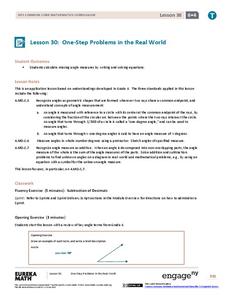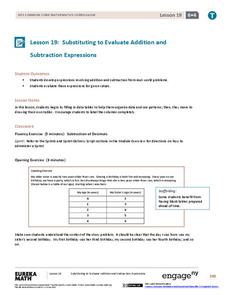Curated OER
Create Your Own Easter Story
In this Easter worksheet, students look at a picture of a bunny and a basket full of eggs. Students write an Easter story based on the picture.
Curated OER
Maniac Magee Comprehension Questions
Supplement your Maniac Magee lesson plans with a packet of student materials. Included here is a variety of questions about the text. Pupils complete multiple choice and short-answer questions and choose from a variety of extension...
Curated OER
Great Authors Acrostic Poem
In this creative writing instructional activity, students use the letters in AUTHOR to write an acrostic poem. Students write a 6 line poem.
Curated OER
Civil War Acrostic Poem
In this creative writing worksheet, students use the letters in the words CIVIL WAR to write an acrostic poem. Students write a 8 line poem.
Curated OER
Invention Acrostic Poem
In this creative writing worksheet, students write an acrostic poem using the letters in the word INVENTION. Students create a 9 line poem.
EngageNY
Mid-Module Assessment Task: Grade 8 Module 7
Assess pupil understanding of rational and irrational numbers with a mid-module assessment that is the 15th lesson in the 25-part series. The questions represent the objectives in the first half of the series. Topics include decimal...
EngageNY
Factoring Expressions
Factor in an informative resource when teaching about factoring. The 11th lesson in a 36-part module shows pupils how to factor algebraic expressions by applying the distributive property. Some of the problems involve expressions with...
EngageNY
Even and Odd Numbers
Even or not, here I come. Groups investigate the parity of products and sums of whole numbers in the 17th lesson in a series of 21. Using dots to represent numbers, they develop a pattern for the products of two even numbers; two odd...
EngageNY
Interpreting Division of a Fraction by a Whole Number—Visual Models
Divide fractions just like a model does. Pupils visualize the division of a fraction by a whole number by creating models. Scholars make the connection between dividing by a whole number and multiplication before practicing the skill...
EngageNY
Linear Equations in Two Variables
Create tables of solutions of linear equations. A lesson has pupils determine solutions for two-variable equations using tables. The class members graph the points on a coordinate graph.
EngageNY
When Can We Reverse a Transformation? 3
When working with matrix multiplication, it all comes back around. The 31st portion of the unit is the third lesson on inverse matrices. The resource reviews the concepts of inverses and how to find them from the previous two lessons....
EngageNY
One-Step Problems in the Real World
Mirror, mirror on the wall, which is the fairest resource of them all? Individuals write and solve one-step equations for problems about angle measurement, including those involving mirrors. Both mathematical and real-world problems are...
EngageNY
Equivalent Ratios
Equivalent ratios show up on tape. Young mathematicians use tape diagrams to create equivalent ratios in the initial lesson on the topic. They learn the definition of equivalent ratios and use it to build others in the third segment of a...
EngageNY
Interpreting Division of a Whole Number by a Fraction—Visual Models
Connect division with multiplication through the use of models. Groups solve problems involving the division of a whole number by a fraction using models. The groups share their methods along with the corresponding division and...
EngageNY
Ratios
Create ratios using the boys and girls in the class. The first lesson in a 29-part series introduces ratios. Pupils learn to create ratios, write them, and model them with tape diagrams. Class members realize that there are different...
Creative Chemistry
Common Ions and Formulae of Ionic Compounds
This is not a worksheet per se but a reference sheet for your chemistry class. It lists cations and anions, their chemical symbols, and their net charges. Also included is a thorough explanation of combining these ions to form ionic...
Curated OER
Modeling: Having Kittens
Cats can't add, but they do multiply! Determine the number of descendants of a single cat given specific facts about cats and kittens. The lesson focuses on developing strategies for problem solving using both individual and group work....
EngageNY
Euler’s Number, e
Scholars model the height of water in a container with an exponential function and apply average rates of change to this function. The main attraction of the lesson is the discovery of Euler's number.
EngageNY
Interpreting and Computing Division of a Fraction by a Fraction—More Models II
No more inverting and multiplying to divide fractions. Applying concepts of measurement division from the previous lesson plan, pupils consider partitive division using fraction bars and number lines. They first convert fractions to like...
EngageNY
The Division Algorithm—Converting Decimal Division into Whole Number Division Using Mental Math
Make math much simpler with mental math methods. The 16th installment in a series of 21 looks at ways scholars can apply mental math to convert division problems into easier problems with the same quotient. Multiplying or dividing both...
EngageNY
Ordering Integers and Other Rational Numbers II
Individuals build on prior knowledge to order a set of rational numbers from least to greatest or greatest to least. As part of the lesson, they order rational numbers written in different forms.
EngageNY
Substituting to Evaluate Addition and Subtraction Expressions
Substitute this resource for what you used to use. Learners identify patterns in data tables and write addition and subtraction expressions to represent relationships. Substitution allows them to solve problems in context in the 20th...
EngageNY
Introduction to Simultaneous Equations
Create an understanding of solving problems that require more than one equation. The lesson plan introduces the concept of systems of linear equations by using a familiar situation of constant rate problems. Pupils compare the graphs of...
EngageNY
Solving Percent Problems
Don't discount how much your pupils understand percents! The 27th lesson in a series of 29 presents a problem to find the cost of a discounted outfit. Small groups determine either the original price or the discount received given the...

























